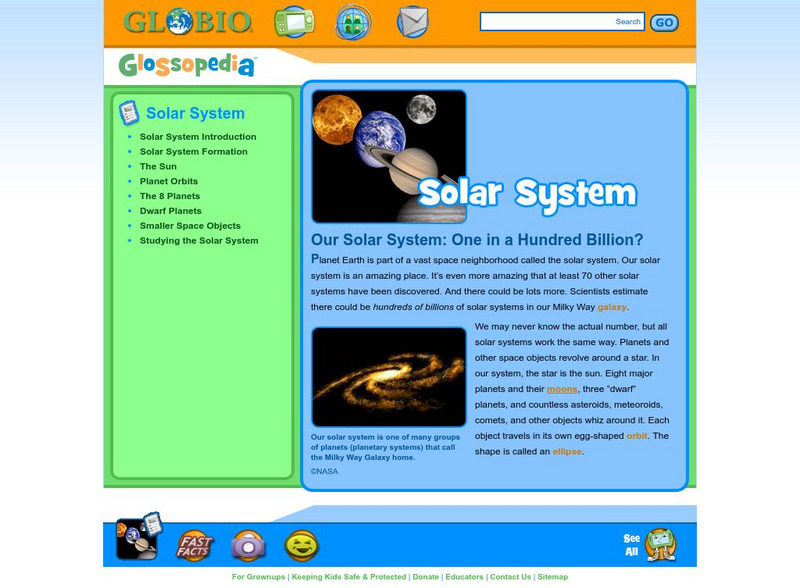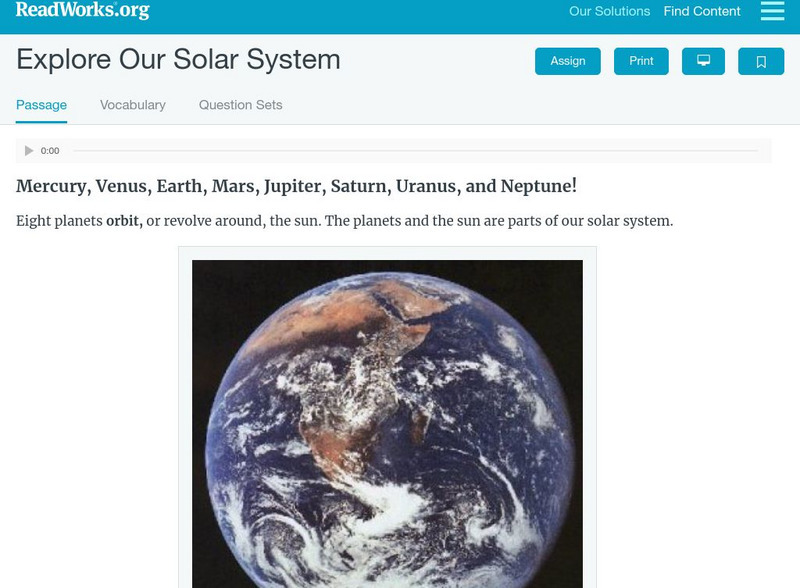Curated OER
Noblesville Fall
Students explore their interest in meteorites. They review the story of the Noblesville meteorite in 1991 and brainstorm how they would feel, what they want to know and what they would do next if they were the boys who discovered the...
Curated OER
Please Ex-Planet
Seventh graders create a model of an earth centered solar system and a model of the sun centered solar system. As a class, they discuss why the earlier astronomers believed their model and why it changed when evidence arose that this...
Curated OER
Scientific Theories
Ninth graders compare and contrast how different models can be used to represent scientific understandings. They evaluate the use of data when considering scientific claims. Students debate a variety of socio-scientific issues and the...
Curated OER
Let's Build a City In the Solar System
Sixth graders explore the solar system. Using the Internet, 6th graders gather information about planets in our solar system. Students participate in an activity to determine where they should build the first city in space. They create a...
Curated OER
Word Processing and Internet Planet Report
Fourth graders write a research report on a selected planet in the solar system. They conduct Internet research, save a graphic from the Internet onto a disk, bookmark websites, and present their report.
Curated OER
The Best of the Solar System - Planetary Research
Students increase their ability to recognize the planets and their surface features. In this exploratory activity students focus on details by studying uncaptioned images.
Curated OER
Best of the Solar System
Students visit a site which provides images to be analyzed. Notes are taken and planets are named based on observed features and observations. Using peer review, they try to determine the identity of the planets. They are free to browse...
Curated OER
Sunscapes
Students share their observations of the Sun, then analyze images collected by NASA's Solar and Heliospheric Observatory. They create exhibitions for presentations.
Curated OER
May The Earth Be Revolving Around The Sun?
Pupils trace the beginning of the heliocentric theory of the solar system--the idea that the solar system revolves around the Sun--to an observation by the Greek astronomer Aristarchus, which convinced him that the Sun was much bigger...
Curated OER
Outer Space and Cyber Space
Fourth graders learn about the Solar System while they use mean, median and mode to explore the characteristics of the planets. Students web publish expository writing.
Curated OER
Earth's Orbit Lesson
Tenth graders devise a computational model to explore how the orbit of the Earth might change if its velocity were different. Using accurately recorded data, 10th graders defend a scientific argument.
Curated OER
Planet/Constellation Mobile
Pupils, through small group discussion, identify and share a rationale for shapes and patterns in the construction of a mobile that represents the solar system that makes them think of the creation of our solar system.
American Institute of Biological Sciences
Action Bioscience: Looking for Life on Mars and Beyond
Learn some of the characteristics of Mars. These characteristics lead some people to believe that life forms may be found on the fourth planet from the Sun.
NASA
Nasa: 21th Century Explorer: Why Do We Want to Study and Travel to Mars?
This article answers some of the most common questions about Mars: Why is it red? Is there water on Mars? What else have scientists discovered from spacecraft that have landed there? Also, visitors can follow links to learn more about...
Smithsonian Institution
National Air and Space Museum: Exploring the Planets: Mercury
This is a useful resource for facts and images pertaining to the planet Mercury.
NASA
Nasa: Night Sky Network: Pocket Solar System
Individual or classroom activity helps students understand the solar system because they can visualize it. Extension resources are included.
NASA
Nasa: Welcome to From Earth to the Solar System (Fettss)
A collection of high-resolution images of space. Images "showcase the discoveries and excitement of planetary exploration, with a focus on the origin and evolution of the Solar System and the search for life".
NASA
Nasa: Students K 4
NASA-sponsored coverage and research on a range of topics related to space exploration -- flying weather stations, comets, first steps on the Moon, and other space-related topics -- are presented in age-appropriate activities, lesson...
Globio
Glossopedia: Solar System
Planet Earth is part of a vast space neighborhood called the solar system. Our solar system is an amazing place. It's even more amazing that many other solar systems have been discovered. This article examines the solar system.
NASA
Nasa: Neptune: Overview: The Windiest Planet
Prepared by NASA, this site provides a detailed look at the planet Neptune. The menu tabs are divided into overview, moons, rings, photo gallery, and facts and figures. Just click to access specific information on any of these topics.
Texas Instruments
Texas Instruments: Solar System
This activity is designed to assess the comprehension of concepts related to the planets and other astronomical bodies in the Solar System.
NASA
Nasa: Our Solar System
This thorough look at our solar system has numerous links to a variety of topics that are updated periodically.
Cool Math
Coolmath: Science Monster: Pluto
A cool fact sheet about Pluto including a place for students to enter their weight on Earth to convert it to what it would be on Pluto.
Read Works
Read Works: Explore Our Solar System
[Free Registration/Login Required] This informational text passage shares facts about planets in the solar system. This passage is a stand-alone curricular piece that reinforces essential reading skills and strategies and establishes...
























